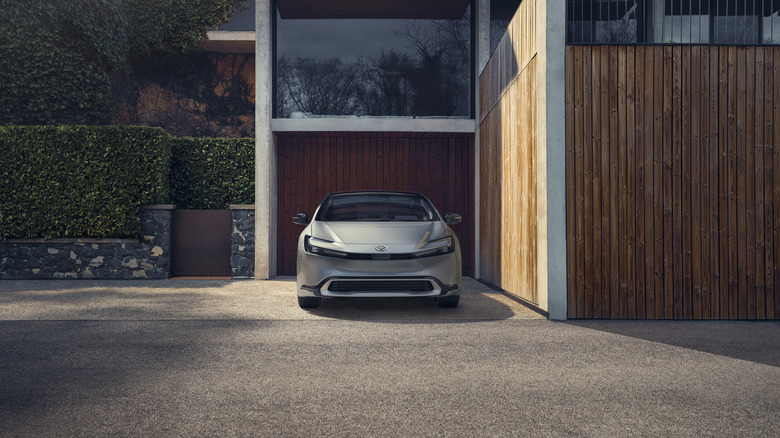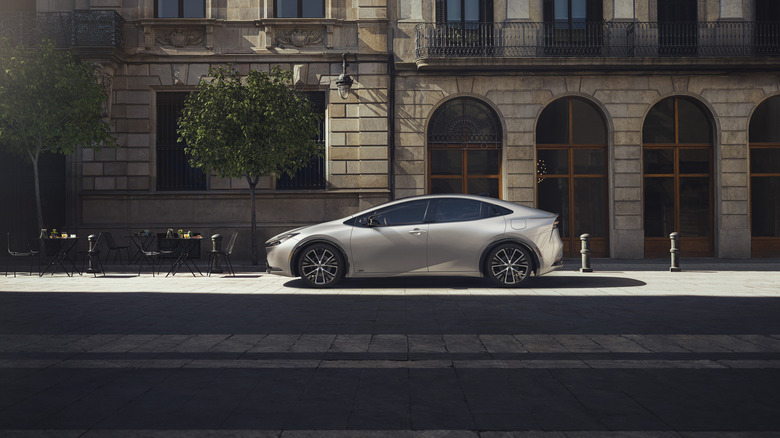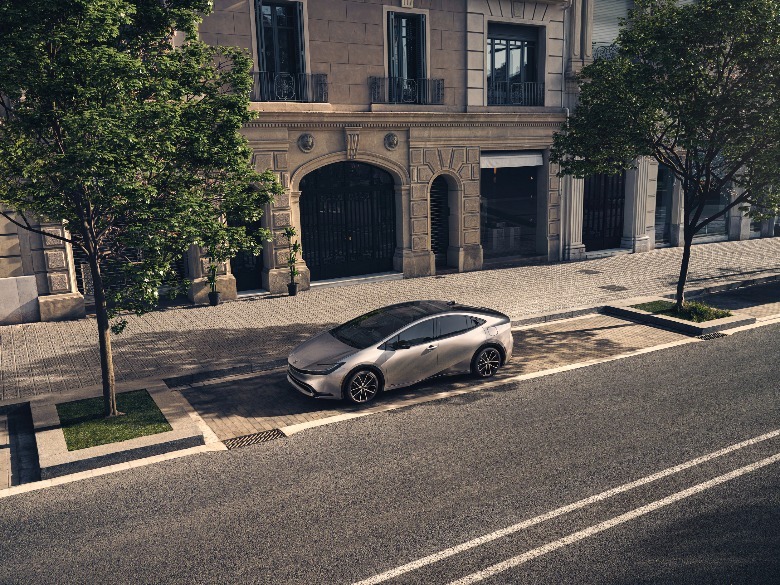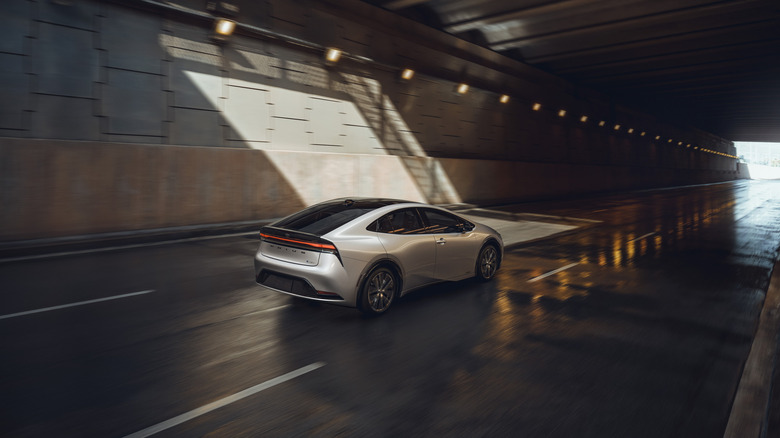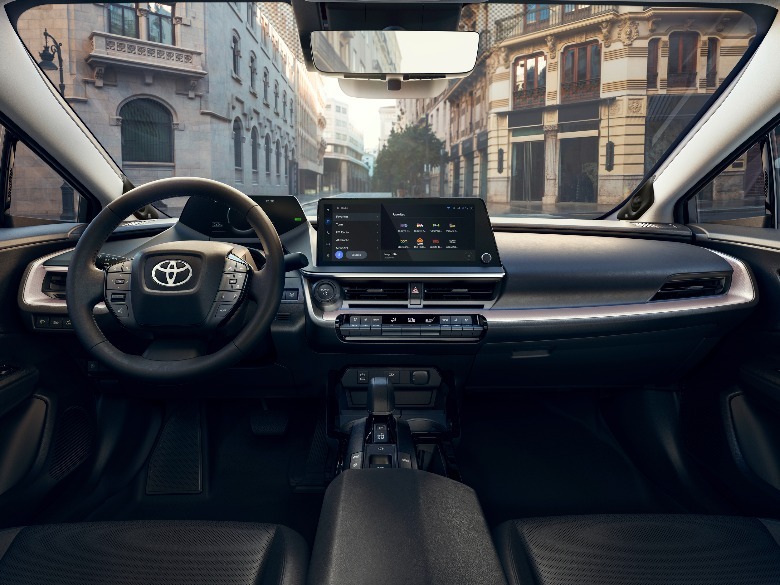Five Reasons The New 2023 Toyota Prius Is A Big Deal
We first heard of the 2023 Toyota Prius in early November, the eagerly-anticipated fifth-generation model of Toyota's breakthrough hybrid car. The Prius name and its expanding lineage have gone a long way since its debut in 1997 as Toyota's first-ever hybrid car, and the world's first mass-produced hybrid vehicle. It came to the U.S. market in 2001 and immediately became the symbol of "greener motoring" among eco-conscious buyers and Hollywood bigwigs.
Equipped with a hybrid-electric powertrain capable of returning up to 50 mpg, the Prius was never about style, performance, or sporty handling. However, the all-new 2023 Prius will change all that. We can't help but admire Toyota's newfound styling idiom to make its hybrid and hydrogen cars look more desirable than ever before.
It started with the sharp-looking Mirai FCEV that debuted in 2021, and the recently unveiled 2023 Toyota Corolla Hybrid. We're proud to say the new Prius has never been prettier, and is one of the five reasons Toyota's hybrid car deserves a second look.
Piercing silhouette
After languishing in obscurity for almost two decades in the style department, the 2023 Toyota Prius has finally morphed into a swan. Underpinned by the brand's lighter and more rigid TNGA-C architecture, the new Prius is broader and has a lower center of gravity. The roofline is two inches lower than the outgoing Prius, and Toyota moved the hip point an inch lower to complete the lower-slung silhouette. The results are a more aerodynamically-sculpted vibe and the most desirable haunches we've seen in a Prius.
Fifth-gen hybrid powertrain
Underneath those curvy body panels is Toyota's fifth-generation hybrid powertrain, comprised of a burlier 2.0-liter gasoline engine and an optional electronic, on-demand all-wheel drivetrain using an electric motor to power the rear wheels. The new Prius FWD has 194 horsepower, while the AWD variant has 196 horsepower. Moreover, a new lithium-ion battery pack under the rear seats offers a 15% increase in output while reducing size and weight.
Toyota claims the FWD Prius goes from zero to 60 mph in 7.2 seconds, better than the outgoing model's sluggish 9.8 seconds. Choose the AWD variant, and you get zero to 60 mph in 7.0 seconds, while getting more traction over slippery or challenging terrain.
Astonishing fuel economy
The 2023 Toyota Prius is not only more potent and quicker off the line, but it also remains a fuel-sipping machine. Toyota claims an estimated 57 mpg in the combined cycle for the Prius LE FWD variant, making it the most fuel-efficient Prius to hit the streets.
Generous features
The 2023 Toyota Prius will arrive at dealerships in a trio of trim grades: LE, XLE, and Limited. Standard in the base Prius LE is 17-inch wheels, six USB ports, an electronic parking brake, an 8-inch infotainment touchscreen, and a steering wheel wrapped in premium SofTex leather. Meanwhile, the Prius XLE adds 19-inch wheels, an eight-way power driver's seat, heated front seats, rain-sensing wipers, wireless smartphone charging, and SofTex seats.
The range-topping Prius Limited takes it up a notch with a fixed glass roof, a heated steering wheel, heated and ventilated front seats, memory settings for the power driver's seat, an eight-speaker JBL audio system, and a 12.3-inch infotainment touchscreen with voice control, an intelligent assistant, wireless Apple CarPlay and Android Auto connectivity, over-the-air (OTA) updates, and more.
Updated safety technology
The new Toyota Prius comes standard with Toyota Safety Sense 3.0, an updated version of the previous safety package with improved sensing and monitoring capabilities. The safety suite consists of a pre-collision system (with pedestrian detection), dynamic radar cruise control, lane departure alert, lane tracing assist, automatic high beams, road sign assist, and a proactive driving assist feature. In addition, all trims get standard blind spot monitoring with rear cross-traffic alert.
Other details on the 2023 Toyota Prius, like pricing and the on-sale date, will be announced later in 2022. Toyota is a bit late in the all-electric era, but you can't fault the automaker for sticking to its excellent hybrid-electric technology.
